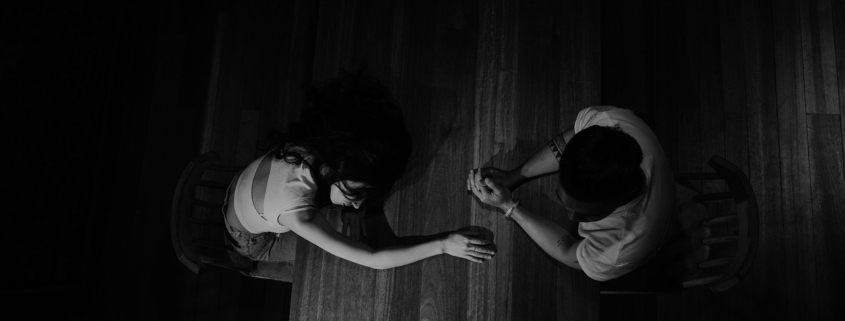As someone who has spent over two decades counseling couples through life’s most challenging seasons, I’ve witnessed firsthand how the twin forces of codependency and addiction can create destructive patterns that leave relationships hanging by a thread. These intertwined issues represent some of the most complex dynamics that couples face, often silently eroding the foundation of otherwise loving relationships.
In my practice, I’ve sat across from countless couples where one partner’s substance abuse is matched only by the other’s desperate attempts to control, fix, or shield them from consequences. What began as care and concern slowly transforms into something that inadvertently fuels the very problem they’re trying to solve.
What Is Codependency and How Does It Relate to Addiction in Couples?
Codependency is a learned behavioral pattern where one person becomes excessively emotionally or psychologically reliant on another, often prioritizing their partner’s needs above their own to an unhealthy degree. Though the term originated in the context of alcoholism treatment in the 1950s, our understanding has evolved to recognize codependency as a distinct relationship dynamic that can exist with various forms of addiction.
In couples affected by addiction, codependency manifests as a particular kind of relationship imbalance. The codependent partner often assumes a caretaking role that goes beyond normal support, becoming enmeshed in managing their partner’s addiction and its consequences. Their sense of purpose, identity, and self-worth becomes deeply tied to their ability to “help” or “save” their addicted partner.
Dr. Melody Beattie, a pioneer in codependency research, describes it as “a person who has let another person’s behavior affect him or her, and who is obsessed with controlling that person’s behavior.” This definition captures the essence of what happens in these relationships—the codependent partner’s emotional state becomes contingent on the addicted partner’s behavior and recovery.
The Historical Context of Codependency
The concept of codependency first emerged from observations of spouses of alcoholics in the mid-20th century. Mental health professionals noticed patterns of behavior in these individuals that seemed to inadvertently enable their partners’ drinking. The term “co-alcoholic” was initially used before evolving into “codependent” as understanding broadened to include relationships involving other substances and behavioral addictions.
Today, while codependency isn’t classified as a mental health disorder in the DSM-5 (Diagnostic and Statistical Manual of Mental Disorders), it’s widely recognized by clinicians as a significant relationship pattern that requires therapeutic intervention.
Signs of Codependency in Relationships Affected by Addiction
Identifying codependency can be challenging because many behaviors begin as normal expressions of love and support. However, several key indicators suggest the relationship has crossed into codependent territory:
1. Enabling Behaviors
The clearest sign of codependency in an addiction context is enabling—actions that inadvertently support the addiction by shielding the addicted partner from consequences. These may include:
- Making excuses for the addicted partner’s behavior to family, friends, or employers
- Calling in sick to work on their behalf
- Providing money that may be used for drugs or alcohol
- Cleaning up messes (literal or figurative) caused by the addiction
- Lying to others about the severity of the problem
Sarah, a client in her late 40s, once confessed to me, “I realized I had withdrawn nearly $30,000 from our retirement account over three years to cover his gambling debts. Each time I told myself it was the last time, that I was just preventing our family from falling apart.”
2. Caretaking to the Point of Self-Neglect
Codependent partners often:
- Abandon their own needs, interests, and self-care
- Spend excessive time worrying about and attempting to manage their partner’s addiction
- Neglect their own health, career, or relationships with others
- Define their self-worth through their ability to care for their partner
3. Boundary Issues
Healthy boundaries are nearly impossible to maintain in codependent relationships. Common boundary problems include:
- Difficulty saying “no” to requests
- Tolerating inappropriate, harmful, or abusive behavior
- Feeling responsible for their partner’s emotions and actions
- Struggling to identify where their responsibilities end and their partner’s begin
4. Control Patterns
A paradoxical aspect of codependency is the simultaneous feeling of being out of control while attempting to control everything:
- Constantly monitoring the addicted partner’s behavior
- Searching for evidence of substance use
- Trying to manage their partner’s recovery process
- Attempting to control access to money, transportation, or social activities
5. Emotional Dependence
Codependent partners often experience:
- Extreme mood fluctuations based on their partner’s sobriety or relapse
- Feelings of anxiety when unable to check on their partner
- A sense of purpose derived primarily from being needed
- Fear of abandonment or being alone
6. Denial and Minimization
Just as addiction involves denial, codependency often features:
- Downplaying the severity of their partner’s addiction
- Ignoring their own emotional pain
- Rationalizing problematic behavior
- Believing things will improve without significant intervention
How Codependency Enables and Worsens Addiction
The relationship between codependency and addiction creates a self-perpetuating cycle where each condition reinforces the other. Understanding this cycle is crucial for breaking it.
The Reinforcement Cycle
When a codependent partner repeatedly shields their addicted loved one from experiencing the natural consequences of their behavior, they inadvertently remove important motivators for change. For instance, if a partner consistently makes excuses to an employer about absences caused by hangovers, the addicted individual never faces the employment consequences that might otherwise prompt them to reconsider their drinking habits.
This pattern creates what therapists call “secondary gain” for the person with addiction—the benefits they receive (beyond the chemical effects of the substance) that reinforce their continued use. These gains might include:
- Avoidance of responsibility
- Being cared for by their partner
- Not having to face difficult emotions or situations
- Maintaining access to the substance without significant barriers
The Erosion of Natural Deterrents
Every addiction typically comes with natural deterrents—the negative consequences that would normally discourage the behavior. These might include:
- Financial problems
- Health consequences
- Legal issues
- Relationship conflict
- Professional setbacks
When a codependent partner continuously buffers these consequences, they remove the friction that might otherwise create motivation for change. As one recovering client put it, “I didn’t hit rock bottom for years because my wife kept building me a comfortable cushion every time I fell.”
Learned Helplessness
Over time, this dynamic fosters learned helplessness in the addicted partner. They begin to believe—often unconsciously—that they cannot manage their own problems, make decisions, or face challenges without their partner’s intervention. This undermines their sense of agency and self-efficacy, which are essential components for recovery.
Effects of Addiction on a Codependent Relationship
While codependency enables addiction, addiction simultaneously exacerbates codependent tendencies, creating a destructive feedback loop with widespread effects on the relationship.
Trust Erosion
Addiction often involves dishonesty—about use, money spent, whereabouts, or intentions. This systematic breakdown of honesty creates deep wounds in the relationship:
- The codependent partner becomes hypervigilant, constantly looking for signs of use
- The addicted partner may hide or lie even when unnecessary due to established patterns
- Both partners begin to doubt their own perceptions of reality (a phenomenon often called gaslighting)
Communication Breakdown
Healthy communication becomes nearly impossible when addiction and codependency dominate a relationship:
- Conversations revolve predominantly around the addiction or avoiding discussion of it
- Emotional honesty becomes sacrificed to maintaining peace
- Underlying issues remain unaddressed as the addiction becomes the sole focus
- Resentments build without proper resolution
Financial Strain
The economic impact of addiction and codependency can be devastating:
- Direct costs of sustaining the addiction (substances, gambling losses, etc.)
- Indirect costs such as missed work, legal fees, or medical expenses
- Poor financial decisions made under the influence
- Resources depleted by the codependent partner’s attempts to “fix” various problems
Isolation
Couples struggling with these dynamics often become increasingly isolated:
- Withdrawal from family and friends who express concern
- Reduced social engagement to hide the addiction
- Shame and embarrassment leading to self-imposed isolation
- Creation of a closed system where unhealthy dynamics go unchallenged
Physical and Mental Health Consequences
Both partners typically experience significant health impacts:
- For the addicted partner: The direct health effects of substance abuse or behavioral addiction
- For the codependent partner: Stress-related conditions, anxiety, depression, and neglected self-care
- For both: Sleep disturbances, compromised immune function, and chronic stress

Breaking the Cycle of Codependency and Addiction
Breaking free from the intertwined patterns of addiction and codependency requires coordinated effort addressing both issues simultaneously. Neither can be fully resolved in isolation.
Recognition and Acceptance
The first step toward healing is recognition—acknowledging the true nature and extent of both the addiction and the codependent behaviors. This often involves:
- Moving beyond denial about the severity of the situation
- Accepting that both partners need help, not just the one with addiction
- Understanding that quick fixes or promises alone won’t create lasting change
- Recognizing that the relationship has developed unhealthy patterns beyond the addiction itself
Establishing Healthy Boundaries
For the codependent partner, establishing clear, consistent boundaries is fundamental to recovery:
- Identifying what behaviors they will and won’t tolerate
- Communicating these boundaries clearly and calmly
- Following through with pre-determined consequences when boundaries are violated
- Distinguishing between helping and enabling
As one recovering codependent shared in a group session, “Learning to say ‘I love you, but I won’t bail you out of jail again’ was the hardest and most important sentence I ever spoke.”
Separate Recovery Journeys
While couples must ultimately work together to heal their relationship, each partner needs their own recovery path:
- The addicted partner needs specialized addiction treatment addressing their specific substance or behavioral addiction
- The codependent partner needs support focused on rebuilding identity, establishing boundaries, and developing healthier relational patterns
- Both need to address any underlying trauma, mental health conditions, or childhood experiences that contributed to these patterns
Rebuilding Identity Beyond the Dynamic
For lasting recovery, both partners need to develop or rediscover their individual identities:
- The codependent partner must find purpose and worth outside of caretaking
- The addicted partner needs to establish identity beyond their addiction
- Both need to reconnect with personal interests, goals, and relationships that exist independently of each other
Treatment Options for Codependency and Addiction in Couples
Effective treatment typically involves multiple approaches tailored to the couple’s specific situation.
Individual Therapy
Each partner benefits from one-on-one therapy:
- For the addicted partner: Addressing addiction triggers, developing coping mechanisms, and treating co-occurring mental health conditions
- For the codependent partner: Processing enabling behaviors, establishing healthy boundaries, and building self-worth independent of their caretaking role
Couples Therapy
Specialized couples counseling can address relationship dynamics:
- Behavioral Couples Therapy (BCT) has strong research support for addiction contexts
- Emotionally Focused Therapy (EFT) helps rebuild secure attachment
- The Gottman Method can restore trust and healthy communication patterns
Support Groups
Peer support provides validation and practical strategies:
- 12-step programs like Alcoholics Anonymous or Narcotics Anonymous for the addicted partner
- Al-Anon, Nar-Anon, or CoDA (Codependents Anonymous) for the codependent partner
- Couples groups where both can learn from others facing similar challenges
Family Therapy
Since these dynamics often affect the entire family system:
- Family therapy helps heal relationships with children and extended family
- Educates family members about both codependency and addiction
- Establishes healthier family communication patterns
Supporting a Partner with Addiction While Avoiding Codependency
For those who recognize codependent tendencies in themselves while supporting a partner with addiction, finding the balance between genuine support and enabling can be challenging.
Educate Yourself
Knowledge is power in breaking codependent patterns:
- Learn about the specific addiction your partner faces
- Understand the difference between helping and enabling
- Study the science of addiction as a brain disease to reduce judgment and blame
- Recognize codependent behaviors in yourself
Prioritize Self-Care
Self-care isn’t selfish—it’s essential:
- Maintain regular health practices (sleep, nutrition, exercise)
- Cultivate interests and relationships independent of your partner
- Attend to your own emotional and mental health needs
- Set aside time for activities that bring you joy and fulfillment
Seek Support
Don’t try to manage this alone:
- Join support groups specifically for loved ones of addicted individuals
- Consider individual therapy with a specialist in codependency
- Build connections with others who understand your situation
- Be open with trusted friends and family about your struggles
Practice Detachment with Love
Detachment doesn’t mean abandonment or apathy:
- Love the person while acknowledging you can’t control their addiction
- Allow them to experience natural consequences of their actions
- Focus on managing your responses rather than their behavior
- Recognize when you’re taking responsibility for their choices
As Melody Beattie writes, “Detachment is based on the premises that each person is responsible for themselves, that we can’t solve problems that aren’t ours to solve, and that worrying doesn’t help.”
Establishing Healthy Boundaries in Relationships Affected by Addiction
Boundaries represent the frontline in addressing codependency and supporting recovery from addiction.
Types of Boundaries Needed
Several categories of boundaries typically need attention:
- Physical boundaries: Personal space, touch, sexual intimacy, and safety
- Emotional boundaries: Separating your feelings from your partner’s, not taking responsibility for their emotions
- Financial boundaries: Protecting resources, not funding the addiction
- Behavioral boundaries: What actions you will and won’t tolerate in your presence
Communicating Boundaries Effectively
How boundaries are communicated significantly impacts their effectiveness:
- Use clear, simple language without accusation
- Focus on “I” statements rather than “you” statements
- Clearly outline consequences for boundary violations
- Remain consistent in enforcement
For example, instead of saying “You always get drunk and embarrass me,” a healthier boundary statement might be: “I feel uncomfortable in situations involving heavy drinking. If you choose to drink excessively at this event, I will take my own car so I can leave if needed.”
Common Boundary Challenges
Several obstacles often arise when establishing boundaries:
- Guilt and fear when enforcing consequences
- Manipulation tactics from the addicted partner
- Inconsistent boundary enforcement sending mixed messages
- Confusion between punishment and natural consequences
Progressive Boundary Setting
Boundaries often need to evolve with the situation:
- Begin with smaller, manageable boundaries before tackling major issues
- Adjust boundaries as recovery progresses or relapses occur
- Recognize when temporary separation might be necessary for safety or recovery
- Allow boundaries to eventually relax as health is restored to the relationship
Is Codependency Considered a Mental Health Disorder?
Codependency occupies an interesting position in mental health classification. While not officially recognized as a distinct disorder in the DSM-5, mental health professionals widely acknowledge its significance.
Current Clinical Understanding
The current professional perspective on codependency:
- Not classified as a specific mental health disorder
- Often considered a relational pattern or personality style
- Frequently occurs alongside recognized conditions like depression, anxiety, or dependent personality disorder
- May qualify for treatment under “Other Specified Relational Problem” in clinical settings
Why Classification Matters
The lack of official diagnostic status has implications:
- Insurance coverage for treatment specifically targeting codependency may be limited
- Research funding for codependency-specific interventions is less robust
- Some critics argue that pathologizing caregiving behaviors can be problematic
- Others advocate for official recognition to validate the experiences of those affected
The Spectrum Perspective
Many therapists view codependency on a spectrum rather than as a binary condition:
- Mild codependent tendencies may appear in many relationships
- Moderate codependency manifests when these tendencies begin causing distress
- Severe codependency significantly impairs functioning and well-being
- The level of intervention needed corresponds to the severity of the pattern
Long-Term Outcomes for Couples Dealing with Codependency and Addiction
Without appropriate intervention, couples trapped in codependent-addictive relationships face challenging prospects. However, with proper treatment, significant positive transformation is possible.
Untreated Outcomes
When these intertwined issues remain unaddressed:
- Progressive worsening of both the addiction and codependent behaviors
- Increasing relationship dysfunction and dissatisfaction
- Higher risk of physical and mental health problems for both partners
- Greater likelihood of financial problems and instability
- Potential for the relationship to become emotionally or physically abusive
- Transmission of unhealthy relationship patterns to children
Treated Outcomes
With comprehensive treatment addressing both issues:
- Many couples achieve healthier, more balanced relationships
- The addicted partner can maintain long-term recovery
- The codependent partner develops stronger sense of self and boundaries
- Communication patterns improve significantly
- Both individuals report greater life satisfaction and well-being
- New, healthier relationship skills can be modeled for children
Factors Affecting Outcomes
Several variables influence the prognosis for these couples:
- Timing of intervention (earlier treatment generally yields better outcomes)
- Commitment of both partners to their individual recovery processes
- Access to appropriate, specialized treatment resources
- Presence of co-occurring mental health conditions
- Level of external support from family and community
- Willingness to make significant lifestyle changes
Recovery as a Lifelong Process
For most couples, recovery from these entrenched patterns is not a one-time event:
- Both addiction recovery and codependency recovery typically require ongoing attention
- Relapse can occur in either the addiction or the codependent behaviors
- Success often involves periodic “tune-ups” with counseling or support groups
- Vigilance about slipping back into old patterns, especially during stressful periods
Building a New Relationship Foundation After Codependency and Addiction
Recovery offers the opportunity to essentially rebuild the relationship from the ground up, replacing dysfunctional patterns with healthier alternatives.
Restoring Trust
Trust—often severely damaged by addiction—requires intentional rebuilding:
- Consistent honesty about small matters builds credibility for larger issues
- Transparency about whereabouts, activities, and finances may be necessary initially
- Recognition that trust returns gradually, not immediately upon promises of change
- Acknowledgment of hurt caused without defensive responses
Developing Healthy Interdependence
The goal isn’t complete independence but balanced interdependence:
- Mutual support without rescuing or controlling
- Shared goals alongside individual pursuits
- Emotional intimacy while maintaining appropriate boundaries
- Vulnerability without manipulation
Creating New Rituals and Patterns
Recovery necessitates replacing addiction-centered routines:
- Developing new traditions and activities that don’t involve substances
- Finding shared interests that support recovery
- Creating rituals that encourage connection and communication
- Establishing patterns that reinforce each partner’s individual growth
Ongoing Growth and Learning
Couples who successfully navigate these challenges often discover:
- A deeper, more authentic connection than before
- Greater emotional intelligence and communication skills
- Increased capacity for empathy and understanding
- Resilience that transfers to other life challenges
Hope for Healing
Understanding codependency and addiction in couples reveals a complex but treatable relationship dynamic. While these intertwined issues create significant challenges, they aren’t insurmountable. With proper intervention, commitment to change, and patience through the recovery process, couples can not only survive these issues but emerge with stronger, healthier relationships.
If you recognize these patterns in your own relationship, remember that seeking help isn’t a sign of weakness but of courage and wisdom. The journey toward healing may be challenging, but countless couples have successfully navigated this path before you. Whether through Couples Rehab, professional counseling, support groups, or a combination of approaches, taking that first step toward addressing both the addiction and the codependent behaviors opens the door to profound transformation and renewal.
Resources for Help and Support
For those struggling with codependency and addiction in their relationship, numerous resources are available:
- National Helplines: SAMHSA’s National Helpline (1-800-662-HELP) provides 24/7 information and treatment referrals
- Support Groups: Al-Anon, Nar-Anon, and Codependents Anonymous (CoDA) have chapters nationwide
- Treatment Directories: The Psychology Today Therapist Finder can help locate specialists in both addiction and codependency
- Educational Resources: Books like “Codependent No More” by Melody Beattie and “The Language of Letting Go” offer valuable insights
- Online Communities: Forums and virtual support groups provide connection for those unable to attend in-person meetings
Remember that reaching out for help is not an admission of failure but the first step toward reclaiming your relationship and yourself from these destructive patterns.



















